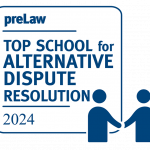Expand your credentials with Summer Institute courses
Summer is a great time to expand your skills and experience, and perhaps even add a certificate to your resume as you prepare yourself for professional advancement. DRI’s Summer Institute courses are available to degree and non-degree seeking students with their future in mind. In these courses, you are among a broad cross-section of law and graduate students, practicing lawyers, human resources and business personnel, and other professionals, which mirrors the contemporary, multidisciplinary workplace.
 Summer Institute courses are taught by nationally and internationally recognized faculty actively involved in ADR practice, research, publication, and teaching.
Summer Institute courses are taught by nationally and internationally recognized faculty actively involved in ADR practice, research, publication, and teaching.
2024 Summer Institute
Asynchronous Online course
-
Organizational Conflict Management | June 2-July 13, 2024
(Final Paper due July 20, 2024)
2 law school credits | 24 MN Rule 114 continuing education credit
Faculty:
Aimee Gourlay, Collaboration Services Manager, League of Minnesota Cities Insurance Trust.This course explores the nature and sources of systemic and organizational conflict and provides students with an opportunity to develop practical skills to prevent destructive conflict before it occurs and manage inevitable conflicts which arise in organizations. This course will utilize a range of modalities including case studies, discussions and research projects to illustrate key organizational conflict concepts. Students will learn how to analyze conflicts and help organizations create productive outcomes.
On campus courses
(Arranged in chronological order)
-
-
-
-
Arbitration | May 19-23, 2024
2 law school credit
May 19 (9 am – 5 pm) and May 20, 21, 22, 23 (4:30 – 9:30pm)
(Final Paper due June 13, 2024)
24 CLE credits applied for
Faculty:
Benjamin Davis, Professor of Law Emeritus, University of Toledo College of LawThis foundation course covers the salient points of U.S. arbitration law as it relates to domestic and international matters. The course curriculum begins with an introduction to the basic legal concepts that make up arbitration law and to the institutions that are central to arbitration practice. Consideration of the Federal Arbitration Act follows, along with a systematic treatment of the role of contract in arbitration and the function of subject matter inarbitrability. Problems relating to the enforcement of arbitral awards, the role of the arbitrator (focusing on the arbitrator’s functions, duties, and responsibilities), and other practice issues are examined. The basic facets of international commercial arbitration also are introduced. Through lectures, demonstrations, discussions, and simulations, this interactive curriculum is designed to foster effective use of contemporary arbitral processes.
-
-
-
-
-
-
Mediation | June 1-8, 2024
3 law school credit
June 1, 2, 8 (9 am – 5 pm); June 4, 5, 6 (5 – 9 p.m.)
(Final Paper due June 24, 2024)
35 CLE credits applied for; MN Rule 114 certification for civil facilitative/hybrid neutrals applied for
Faculty:
Joseph (Josh) Stulberg, Professor of Law Emeritus, The Ohio State University Moritz College of LawThrough discussion, simulations, and roleplay, this course focuses on the structure and goals of the mediation process and on the skills and techniques mediators use to aid parties in overcoming barriers to dispute resolution. The course also examines the underlying negotiation orientations and strategies that mediators may confront and employ; the roles of attorneys and clients; dealing with difficult people and power imbalances; cultural, race, and social identity considerations; and ethical issues for lawyers and mediators. In addition, special attention is devoted to the art of successful representation of clients in mediation.
-
-
-
-
-
Justice in the Digital Era | June 10-15, 2024
2 law school credits
June 10, 11, 12, 13 (4:30 – 9:30 pm) & June 15 (9 am – 5 pm)
24 CLE credits applied for; 24 MN Rule 114 continuing education credits
Faculty:
Oladeji Tiamiyu, Assistant Professor of Law, Sturm College of LawThis week-long course explores the role of Online Dispute Resolution (ODR) within the context of the broader dispute resolution field. In exploring different technologies that ODR incorporates, this course invites students to consider lessons that can be learned in using technology to resolve, manage, and prevent disputes. The course is for both tech-curious and tech-loving students who want to collaboratively explore challenging questions about the opportunities and trade-offs associated with digitizing justice.
-
-
-
-
-
Theories of Conflict | June 15-20, 2024
2 law school credits
June 15 (9 am – 5 pm) & June 17, 18, 19, 20 (4:30 – 9:30 pm)
(Final Paper due for 2-cr. students July 8, 2024; 3-cr. students August 9, 2024)
24 CLE credits applied for; 24 MN Rule 114 continuing education credits
Faculty:
Ken Fox, Professor, Hamline University School of Business; Senior Fellow, Dispute Resolution Institute, Mitchell Hamline School of LawThis interdisciplinary course introduces students to important theoretical perspectives on our understanding of conflict and conflict response. Specifically, students explore the biological/physiological, psychodynamic, social psychological, communication, and sociological/political perspectives on conflict by reading and discussing major theoretical works within each perspective. Emphasis is on comparing and distinguishing key dimensions of these theories, such as the nature and sources of conflict, conflict escalation, conflict response, and the nature of the third party role. Classes follow an interactive format. Using case studies, exercises, and group discussion to draw upon personal experiences, including those involving race and social identity, the course explores the usefulness of each perspective to understand the experience of conflict.
Note: There is a $100 student fee assessed for course materials. No other book is required.
-
-
-
-
-
Family Mediation |June 22-27, 2024
3 law school credits
June 22, 23, 24, 25, 26, 27 (9 am – 5 pm)
(Final Paper due July 12, 2024)
35 CLE credits applied for; MN Rule 114 certification for family mediation facilitative neutrals applied for
Faculty:
Jana Deach, Family Law Attorney and Shareholder, Moss & BarnettThis is a challenging, high-energy course in basic divorce mediation skills and practice development. Along with the basic content areas of divorce settlement—property division, parenting, child and spousal support, divorce tax issues—the course also addresses the role of consultants and lawyers, conflict theory, psychological issues, power balancing, domestic abuse, drafting agreements, and mediation ethics. Although designed with the law student and family lawyer in mind, the course also is an ideal training and specialization opportunity for therapists and other social service professionals. This course emphasizes experiential learning with the opportunity for individual feedback from experienced coaches.
-
-
-
-
-
Facilitation | July 8-13, 2024
2 law school credits
July 8, 9, 10, 11 (4:30 – 9:30 pm) & July 13 (9 am – 5 pm)
(Final Paper due August 2, 2024)
24 CLE credits applied for; 24 MN Rule 114 continuing education credits
Faculty:
Rachel Viscomi, Clinical Professor of Law, Director, Harvard Negotiation and Mediation ClinicGroup meetings are ubiquitous in the legal and business world yet rarely is much thought given to the nuts and bolts of how to conduct meetings more effectively. With training and preparation, leaders and participants can dramatically improve group dynamics and decision-making. Facilitation is the art of guiding a group to define its purposes, encourage productive interaction, and achieve its goals. The fundamental theory of group facilitation is that every person in a group is a valuable participant whose voice should be heard and who can play a role in building toward more creative, robust and reliable decision-making. This course will explore the theoretical underpinnings of this model of facilitation through lecture, structured role plays, exercises and group discussions. Students will also learn practical facilitation skills, ascertaining a group’s purpose; structuring a meeting process to meet those ends; encouraging story-telling and dialogue; building consensus; and managing conflict. A blend of philosophy and “how to”, the course is suitable for anyone interested in meetings and groups dynamics.
-
-
-
-
-
Negotiation | July 8-15, 2024
3 law school credits
July 8, 9, 10, 11, 15 (4:30 – 9:30 pm); July 13 & 14 (9 am – 5 pm)
(Final Paper due August 4, 2024)
35 CLE credits applied for; 35 MN Rule 114 continuing education credits
Faculty:
James Coben, Senior Fellow, Dispute Resolution Institute , Emeritus Professor of Law, Mitchell Hamline School of LawThis course examines how obvious and not-so-obvious cultural difference impacts resolution of inter-personal and inter-state (international) disputes. Specifically, the course will bring an international perspective to understanding the impact of culture in the most commonly used international and domestic dispute resolution processes (negotiation, mediation and arbitration). It will follow a three-step approach to know and understand the influence of culture on decision-making, including: awareness and knowledge of one’s own culture; knowledge and understanding of another party’s culture; and knowledge and impact of either on the desired goal/outcome of the dispute. This course will help students be more culturally aware and better equipped for effective participation in dispute resolution processes that increasingly involve different languages, customs, values, nationalities, and states of origin.
-
-
Course Requirements
Students must attend all class sessions and complete an advance reading assignment. Degree-seeking students must submit a written paper. Students may take one or more courses. Mitchell Hamline law students may take either the Mediation or Family Mediation course but may not take both for academic credit. Enrollment is limited to enhance the interactive nature of each course.
Course Materials
Syllabi for all courses will be made available at least 2 weeks prior to the first day of class.
Registration
Certificate Students: Complete the online application.
Law and Graduate Students: Degree-seeking law or graduate students currently enrolled in an accredited graduate program should complete the online application form. A letter from their school’s registrar reflecting the applicant’s status as a student in good standing with permission to take the Mitchell Hamline course(s) as a visiting student will need to be provided.
Attorneys: Attorneys may apply for summer courses by completing the online application form. Attorneys will be granted special student status.
Others: Other professionals may apply to take summer courses by completing the online application form. To be considered, applicants must furnish a transcript indicating completion of an undergraduate or graduate degree.
Tuition
Audit: $650/credit, except for the courses that qualify for MN Supreme Court Rule 114 Certification, which are offered at a flat rate as follows:
-
-
-
- Mediation and Family Mediation: $1,250
-
-
Certificate students: $930/credit
Full tuition due 1 week prior to the start of the course.
For further information on tuition costs, contact Kitty Atkins | 651.695.7677 | kitty.atkins@mitchellhamline.edu
Questions
Contact kitty.atkins@mitchellhamline.edu | 651.695.7677


